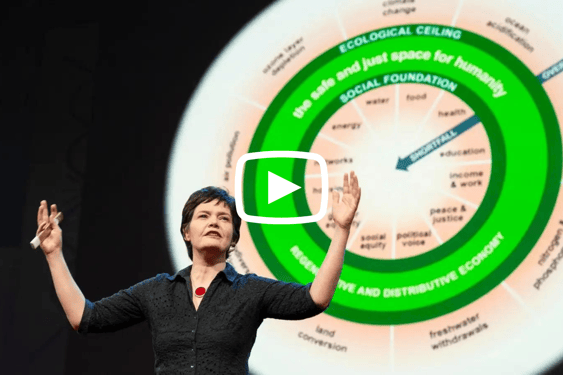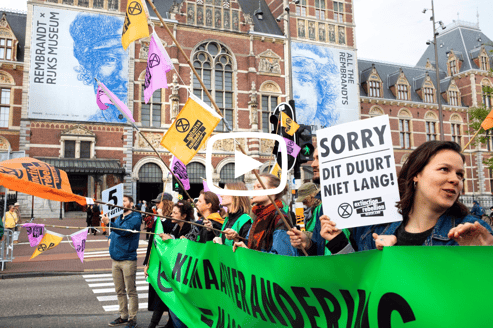
Three times Ajax in Rotterdam
Presenting our economic views to colleagues and clients has been a key part of my job for many years. So, many years ago, I was invited to present to colleagues at the head office in Rotterdam, a great building at Coolsingel. In those days, we all wore ties all of the time. As a keen Ajax supporter, I have a number of Ajax ties. The day I was heading for Rotterdam I happened to be wearing one. This was not meant as a provocation, I had not given it any thought. But people in Rotterdam don’t particularly like Amsterdam or Ajax.
They usually even avoid the use of the name Amsterdam, instead referring to it as 020 (as in the telephone area code). My Ajax tie was discreet so nobody noticed. But as I was walking up and down in front of the room I suddenly spotted it and thought I’d better mention it and apologise before someone else noticed it. I got some boos in response, but that was it. After the presentation, the host thanked me and presented me with a tie he had quickly organised. He told me I should take off my Ajax tie and put on the other one. One of the colleagues shouted that he wanted my Ajax tie so that he could burn it. Another one chipped in saying that before burning it he wanted “to piss on it…”
Years later I was presenting in Rotterdam to a large group of clients. This time the venue was the zoo, Blijdorp. Everything was going well until during my presentation my phone rang. I had not put it on silent and the phone was loud and could be heard by all. As an Ajax fan, I had installed the Ajax Club song on my phone as a ringtone (well actually, Wilma had done that for me). I realised that playing the Ajax song in front of a large group of Rotterdammers might not go down well. I feared an assault. Much to my surprise, there was no reaction from the attendees. It turned out nobody in Rotterdam recognises the Ajax club song. While I was glad to be able to leave unhurt, the lack of recognition also felt like an insult. It was actually more painful than the beating-up I would have had, had they known the song
On 27 January 2019, Ajax played Feyenoord in Rotterdam in the iconic stadium de Kuip. Of all matches in Dutch football, this game has the most history and rivalry, it is THE classic game, comparable to Real Madrid – Barcelona, El Clásico. It is a game both parties badly want to win. And if either of the clubs has had a disappointing year, beating the arch-enemy can be a great consolation.
Ajax was having a good season, but Feyenoord was not so much. Nevertheless, Feyenoord beat Ajax that day: 6-2. This gave rise to great joy and euphoria in Rotterdam. A few days later I was going to present to a large group of Private Banking clients in Rotterdam; more precisely, the venue was the Maas building which is in effect an extension of the Feyenoord stadium. There may have been 200 clients there. The first speaker of the evening was the CFO of Feyenoord who talked about their plans for a new stadium. I was on after him and as a keen follower of football I could not let the Feyenoord victory go unmentioned. So I asked who had attended the match. Many arms went up enthusiastically. I then offered some thoughts on club loyalty. The loyalty people have for their football club has long fascinated me. People change employers several times in their careers, they change the brand of car they drive, and they move house several times in their lives. Some people also change their partners, even several times, and some people even change their gender. The only thing people never change is the love they have for their football club. One always stays loyal to one’s favourite club. So I told our guests that I have a great love for football, that my dad had taught me a great love for our local club, that I had passed that on to my son, Seán, who is now passing it on to my grandson, Leo, who was three years old at the time. I told them I was going to show them a video of how that worked (organised by Wilma). A few weeks earlier my sister Liesbeth had finished knitting a jumper for Leo with the Ajax logo prominently on the front. The video I showed in the Feyenoord stadium was shot by Claire, my daughter-in-law. It shows my wife holding a bag, telling our grandson he is going to get something. He looks at the bag in suspense. Róisín then takes the Ajax jumper out of the bag. She holds it upside down first. Only when she turns the jumper around does Leo recognise the logo and he leaps up with his hands in the air shouting AJAX!! Laughter all around in the Feyenoord stadium. They hate Ajax, but could not resist the enthusiasm of a small boy.
I later received an email from one of the attendees. Ajax fans are banned from attending matches in Rotterdam, just as Feyenoord fans are not allowed to attend matches in Amsterdam. The email said that I should be the first Ajax supporter to be welcomed back in Rotterdam. That kind of remark made my day.
Can you come upstairs, please?
Many people have left the ABN AMRO organisation over the years. (Many others have joined.) In 2015, I remember one departure in particular. I knew the individual involved reasonably well and my impression was that this person was the type of leader that the bank was looking for. When I got an email that this person was leaving, I was surprised and my impression was that it wasn’t entirely voluntary.
I have never shied away from speaking my mind to senior management even though in some instances it has felt like a completely stupid and entirely unnecessary career-suicide attempt. But you have principles or you don’t. In this specific case, I sent a mail to Gerrit ZALM (CEO), Wietze REEHOORN (CRO) and Kees VAN DIJKHUIZEN (CFO) that I really did not understand this move. Board members obviously are not obliged to explain their decisions to me so I hesitated to press ‘Send’. Would it not be better to just keep my head down? Frustration and principles got the better of me and I did press the button.
Almost instantly I got a call, would I please come upstairs to see Kees. ‘O my goodness, what have I done?’ I wished I hadn’t sent the email. Upstairs I went. Much to my surprise, Kees seemed to welcome the mail as it gave him a chance to explain what was going on. In fact, he told me in some detail why this decision had been taken. His arguments were very solid. I understood.
Bismarck lecture creates an unexpected fan base
In 2017, NIMF, a foundation in the pension sector, invited me to give its annual Bismarck lecture. I gave my view on the Dutch pension system and later published a written text on the basis of the lecture. The pension debate is quite polarised in Holland. I was later invited by the Dutch parliament to speak to their Finance committee as an expert witness. I have never been a member of a political party but I suddenly was very popular with several political parties: 50Plus (a party for the ‘elderly’), GroenLinks (Greens), and the SP (Socialist Party). The trade union FNV also seemed to be among my fans. It was an interesting experience as these parties are not my natural habitat.
The Doughnut Economy and the (dough)nutty professor
My former Economisch Bureau colleague Eric BUCKENS invited me in 2018 to participate in a panel discussion about “The Doughnut Economy”, a book written by British renegade economist, Kate RAWORTH. Eric is involved in social entrepreneurship and he was sponsoring an event at the university in Utrecht. Kate RAWORTH herself was coming as a speaker and panelist. I told Eric that the doughnut economy wasn’t my thing, but he argued that different views would make the discussion more interesting. As I have a problem saying No to such invitations I agreed.
The idea of the doughnut economy is that there is a minimum level of material things we should produce to give everybody a decent life, but there is also a maximum beyond we should not go as that would do irreparable damage to the planet. I have two problems with the ideas developed in the book. First, I believe people respond to incentives and I fail to see sufficient incentives in the doughnut economy. To me, the world projected in the book is another naïve utopian world in which we have seen experiments in the past which have all failed. Second, I disagree with the alarmist view of what’s happening in our world. For some strange reason, people just love apocalyptic stories. But if you look at apocalyptic stories of the past, they have all been proven incorrect. Almost all predictions of the Club of Rome’s 1972 Limits to Growth have proven to be incorrect and hugely over-pessimistic. The panic about acid rain has been shown to be exaggerated as has the panic about the hole in the ozone layer. In her presentation, Kate argued that there are simply too many people on the planet. She came very close to arguing for forced birth control. But the audience loved her, biased as you would such an audience expect to be, no disrespect. Kate, it must be said, also is a great speaker. The audience and the other panelists did not love me, but that is OK. The wife of a nephew of mine was in the audience in her role as a fundraiser for a charity. Afterwards, she said I had done well, had stood my ground and people around her had said: ‘let that man finish what he wants to say’ when I was interrupted.
I arrived early at the venue. It was in the centre of Utrecht, next to the ‘Dom’ in the beautiful ‘academie gebouw’. Parking around there is difficult and I did not want to run the risk of having to walk for miles. When I arrived I was welcomed by a tall youngish man, in his thirties I guess, who introduced himself to me as a professor of one of the humanities at the faculty. He was very pleasant, said he appreciated my coming and we had a nice chat over coffee.
When the panel discussion started, it turned out this young professor was introducing the panelists who were asked to make some remarks before the actual panel started. The professor introduced me as the chief economist of ABN AMRO bank, a huge bank that had been saved by the Dutch government years earlier, using money he had contributed to in taxes. ‘What an asshole”, I thought. But I kept my dignity and said that I was very grateful to him and I reminded him that I as a taxpayer contribute happily to the salary he receives from the Dutch government every month. He had not expected that.
Extinction Rebellion, I am secretly proud
Only recently, the action group Extinction Rebellion held protests in many cities around the world, including Amsterdam in 2019. They blocked some roads in the city and a number of them were arrested by the police. The day after the official protest a large group of them turned up at the bank. They were very vocal. I was heading out for lunch with a colleague and we made sure we did not get in the way of the protesters. Riot police were there and the situation looked pretty explosive. Later I found out that the reason Extinction Rebellion had chosen our offices for their protest that day was because of a column Hans VAN CLEEF had written. Hans is a member of my team and is our oil and gas specialist. He also writes a lot about the energy transition. Hans is a very sound guy. He and I share a belief that alarmism isn’t justified and is certainly not helpful. I am more skeptical than Hans is of activists like Extinction Rebellion. So I was secretly quite chuffed that we had provoked them. Luckily, no harm or damage was done.
2019 - Theo de Kort’s dangerous archives
Theo DE KORT is an ‘information specialist’ who has worked most, or perhaps all (I am not sure) of his career, at Economisch Bureau. He is one of those guys who are not necessarily very visible, but he is crucial to the functioning of the team. He also keeps records of important events. While I was writing this text, I asked Theo if he remembered something that happened in 1992. That is 27 years ago! Not only did he remember, but he also opened a drawer and pulled out the relevant memo dated 1-4-1992 to substantiate what he was saying. His archives are impressive, but, unfortunately, they can sometimes be used against you…
Wilma
This booklet would not be complete without a separate section on Wilma SCHELVIS. Wilma and I have been colleagues for over 20 years. From 1998-2019, she has supported me, helped me, protected me, shielded me, warned me, alerted me, yelled at me, etc. I owe her a lot and I can’t imagine working without her. Twice she followed me when I changed jobs.
 When you work so closely together for so long you become friends. Friends help each other out. Wilma picks me up from the garage when I have to bring my car in for service and I can call on her also outside office hours for whatever support I feel I need. She once assembled a bookcase I had bought in IKEA without my asking her to do that. I know her parents and her brothers and she knows my family and friends. Wilma has often made Ajax Christmas cards for me to send to friends. Everybody in my life knows Wilma. I have tried to support her as well. I have painted the ceiling of her flat and I have put down a lino floor covering in her kitchen. I have also drilled holes in the walls of her new apartment for hanging up things. I have taken down lamps from the ceilings and I once installed fly screens in the windows. Once a year, in the spring, I go to her place with my power hose to clean her balcony. Wilma has great qualities. She is a great organiser and a perfectionist. She can also be very protective of me. I need that. Whenever someone asks me to do something, I find it hard to say no. This often gets me into trouble and always in a time squeeze. Wilma always makes it work.
When you work so closely together for so long you become friends. Friends help each other out. Wilma picks me up from the garage when I have to bring my car in for service and I can call on her also outside office hours for whatever support I feel I need. She once assembled a bookcase I had bought in IKEA without my asking her to do that. I know her parents and her brothers and she knows my family and friends. Wilma has often made Ajax Christmas cards for me to send to friends. Everybody in my life knows Wilma. I have tried to support her as well. I have painted the ceiling of her flat and I have put down a lino floor covering in her kitchen. I have also drilled holes in the walls of her new apartment for hanging up things. I have taken down lamps from the ceilings and I once installed fly screens in the windows. Once a year, in the spring, I go to her place with my power hose to clean her balcony. Wilma has great qualities. She is a great organiser and a perfectionist. She can also be very protective of me. I need that. Whenever someone asks me to do something, I find it hard to say no. This often gets me into trouble and always in a time squeeze. Wilma always makes it work.
I cannot think of a better example of how she always stands up for me than the following anecdote. Wietze, my boss from 2010 to 2017, was in the habit of taking his direct reports out for lunch once a year to have a bilateral talk away from the office. We were going to have lunch in Ouderkerk. Wietze was going to be driven and offered me a lift. I accepted gladly. I was told I had to be at Wietze’s office at a particular time. His office was on the 21st floor. I was on the ground floor and the car was in the basement. Wilma did not see the logic of me going upstairs, only to go downstairs to the car. There was no logic, other than a hierarchy. I was fine with going upstairs to meet Wietze, but Wilma mailed Wietze’s secretary that it made more sense for Wietze to come to me. When the secretary informed Wilma that wasn’t going to happen, Wilma suggested I could meet Wietze and the driver in the garage. When that suggestion was turned down as well as I had no access to that part of the car park, Wilma suggested that I would stand outside at the barrier of the car park and hop in when the car went through. That obviously would have been messy so it wasn’t acceptable to Wietze’s secretary either. In the end, Wilma had to yield to the secretary of the higher-ranking boss. I knew nothing of all this and I took the lift up to meet Wietze to go down again. No problem. Wietze had heard all about this tug of war and told me I had an extremely protective and persistent assistant who caused his secretary quite some trouble! I have been very cross with her once and for a very good reason. In 1999 or 2000 I was heading up the Developed Economies team at Group Economics. We were participating in an internal ABN AMRO indoor, five-a-side football tournament. Wilma was the manager of the football team. I was a good deal older than most of the colleagues playing so I needed my resting times, but I fancied myself as one of the better players. At one stage I had been on the bench for a while and was eager to get back onto the pitch, planning to make a decisive contribution. I asked Wilma when I was going to be getting back on. ‘In a second’, she said. But she lied. Completely ignoring my seniority in the bank she kept me on the bench for a ridiculously and irresponsibly long time. We lost the game…
Wilma, thanks for everything you have done for me and the team! You are a star.






